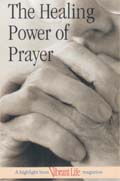The Healing Power of Prayer
 Tammy was a physician with latent-stage melanoma (skin cancer). She was receiving chemotherapy. She was hoping that surgery would soon follow her chemotherapy program.
Tammy was a physician with latent-stage melanoma (skin cancer). She was receiving chemotherapy. She was hoping that surgery would soon follow her chemotherapy program.
In addition to her chemotherapy program, Tammy considered her prayer life to be an integral part of her treatment plan. Tammy knew through her recent personal experience that God had led her each step of the way regarding her medical treatments. She even felt God’s presence and help in small ways throughout her day.
Benefits of Prayer to Your Health
Having an active prayer life is beneficial to your physical and emotional health. Prayer avails you not only of God’s power, but also of His resources. In addition:
1. Prayer gives you freedom from anxiety, with an increased ability to cope with illness, death, or disability.
Knowing that God is in control and you are under His wings can minister to your heart, alleviating any anxious thoughts.
Deanna was a 16-year-old acute leukemia patient. During the five previous years she had had the disease she had relapsed twice. Deanna made a point of staying involved with her church youth group and having an active prayer life. Deanna’s mother knew that Deanna didn’t mind having to come to her clinic appointments or receiving chemotherapy, because she felt as though her medical providers were her friends and encouragers.
2. Prayer helps you deal with depression, leading to a faster recovery.
Laurie was 40-year-old who was part of the faculty at a state university. She was happily married with two teenage daughters. All of a sudden her life went into a tailspin after her program director wrongly accused her of having an illicit affair and spread this gossip around to the students and other faculty members. For weeks afterward Laurie cried a lot and felt powerless to confront the program director.
Finally, after filing her faculty grievance, receiving emotional support from other faculty members as well as the faculty ombudsman, and spending time reevaluating her spiritual life, which included prayer, Laurie began to climb out of her depression. Many months after Laurie’s faculty grievance was settled, the program director was finally fired.
3. Prayer leads to an increased life span and decreased mortality.
Currently in the United States the average age of life expectancy for Caucasian women in 79.7 years. For Caucasian men it is 73.8 years. These results are based on national averages compiled by the Center for Disease Control in Atlanta , Georgia .
Helen would laugh at those statistics. She would look at those figures and after a hearty laugh would say, “Well, it just goes to show I’ve beaten the norm again.” Helen is 85 years old, still lives on her own, and drives to church and the shopping center.
If you were to ask Helen what keeps her so spry, she would tell you her prayer life, her relationship with God, and a large amount of humor. Now, if you think that Helen has had an easy life, think again. She’s survived the Great Depression, the stress of her young husband having to serve in the military during World War II, and numerous personal medical problems. Most recently she has survived the death of her husband of more than 50 years.
Helen’s longevity is just one example of what Drs. G. W. Comstock and J. A. Tonascia found in their study. They found an earlier age of death for those people who were not regular attendees at church services.
4. Prayer allows you to have better health overall.
A recent Duke University study of elderly people in North Carolina followed the correlation between church attendance (which included prayer) and a person’s immune system.
Blood samples were taken from 1,700 study participants at the beginning of the study and then again six years later.
Lab analyses of nine cytokines (cellular markers of the immune system) were run. Researchers were especially interested in those cytokines that help to regulate the inflammatory response. If a patient had a high number of inflammatory cytokines, then their immune system response was depressed.
Researchers found a lower level of five cytokines responsible for the inflammatory response in those elderly patients who attended church and prayer. Therefore, these patients had a higher-functioning immune system than those elderly patients who did not attend church or pray.
Marcia Ory, a senior scientist at the National Institute on Aging, calls this pioneering study incredibly significant because it investigated the “biological linkages” between religious involvement and the immune system.
Leave a Reply
You must be logged in to post a comment.